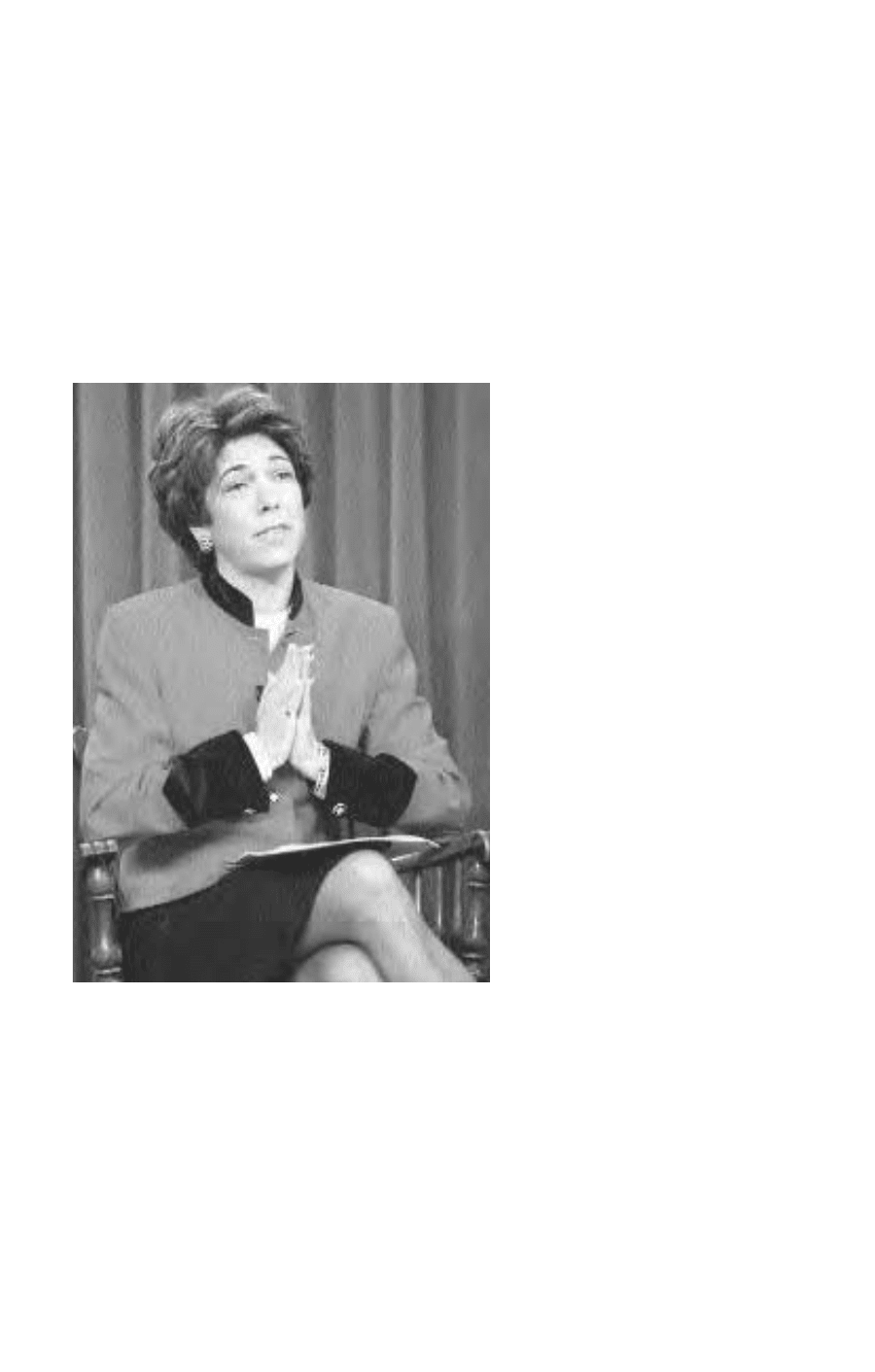Schenken Suzanne O’Dea. From Suffrage to the Senate: An Encyclopedia of American Women in Politics (2 Volumes)
Подождите немного. Документ загружается.


freedom. She was called “Moses” for her work freeing slaves. Of her
work, Tubman said: “I never ran my train off the track and I never lost a
passenger.”
Born in Dorchester County near Cambridge, Maryland, Harriet
Tubman was named Araminta Ross but adopted her mother’s name. Her
parents were probably Ashantis, a West African warrior people. From the
time Harriet Tubman was about five years old, she was rented to neigh-
boring families to do housekeeping, split fence rails, load timber, nurse
children, and perform other tasks. When she was about thirteen years old,
Tubman suffered a serious head injury when she attempted to protect an-
other slave and was hit with a two-pound weight. During her long conva-
lescence, she thought about slavery from a philosophical perspective. She
prayed for her master to free her and her family but learned that he
planned to send them to a chain gang in the Deep South.
Through her philosophy and prayer, she developed self-reliance,
courage, and strength of purpose. Two events helped shape her future: she
married a free black man, and she learned that her mother should have
been freed upon the death of her former owner. Tubman escaped to free-
dom in Pennsylvania in 1849 and worked as a cook and domestic.
The Fugitive Slave Law of 1850 significantly increased the risks for
African Americans who had found freedom in the North because they had
legally become fugitive slaves. After passage of the law, Tubman became
involved with the Philadelphia Vigilance Committee, a group that assisted
fugitive slaves. Through this group, Tubman organized her first return to
the South and learned that the slaves she was to accompany included her
sister and her children. In the spring of 1851, she made the trip and took
them to freedom in Canada. By 1857, she had freed her entire family, in-
cluding her parents.
Tubman’s excursions to the South involved constant danger. The
threat to her safety was made greater because she could neither read nor
write, but she was creative and could quickly develop alternative strate-
gies. For example, while in a small southern town accompanying some
slaves to freedom, she purchased railway tickets to a destination further
south. She hoped that observers would dismiss them, believing that slaves
would not go south to escape. The ruse worked. A reward of $12,000 was
offered for her capture at one point, and in 1858 it reached $40,000.
During the Civil War, Tubman went to South Carolina and Florida to
nurse sick and wounded soldiers and to teach newly freed blacks the skills
to take care of themselves. She organized African American men to scout
the inland waterway of South Carolina for Union raids and assisted in a
raid in the Combahee area.
After the war, she went to her home in Auburn, New York, the place
Tubman, Harriet 669

that had been her base for several years. She helped the poor and disabled
and worked with the black churches that had supported her career on the
Underground Railroad. She purchased land for the Harriet Tubman Home
for Aged and Indigent Colored People in 1896 and opened it in 1908.
During World War II, a liberty ship was christened the Harriet
Tubman.
See also Abolitionist Movement, Women in the; Anthony, Susan Brownell
References Mabunda, ed., Contemporary Black Biography, vol. 9 (1995); Smith,
ed., Epic Lives (1993).
Tyson, Laura D’Andrea (b. 1947)
Laura D’Andrea Tyson served as chair of
the Council of Economic Advisers from
1993 to 1995 and chair of the National
Economic Council from 1995 to 1997.
Tyson began her professional life as a staff
economist at the World Bank and then
taught at Princeton University. In 1978,
she began teaching at the University of
California at Berkeley, where she became
known for her ability to explain complex
economic concepts in interesting and
comprehensible ways. She became a full
professor in 1988. While at Berkeley, she
also served as research director of the
Berkeley Roundtable on International
Economics.
Tyson met then Democratic presi-
dential candidate Bill Clinton in August
1992. Clinton had gathered a group of
economists to explore ways to slow the
decline in U.S. manufacturing. Tyson offered ideas for providing seed
money to companies with promising technologies and other approaches
that appealed to Clinton. After his election, Clinton invited Tyson to
serve as chair on the three-member Council of Economic Advisers.
Tyson described her view of the government’s role in the market:
“The market does many things very well, but there is a rationale for the
government doing things that the market doesn’t do very well. The role of
the Council of Economic Advisers is to help evaluate when there is a de-
fensible role for a government policy and whether government policy in
pursuit of that objective is efficient.”
670 Tyson, Laura D’Andrea
National Economic
Advisor Laura
D’Andrea Tyson
talked to the press
about the budget
impasse, 1996 (Asso-
ciated Press AP)

As a council member, Tyson and others convinced President Bill
Clinton to limit his plans for reducing the federal deficit in order to pro-
tect the nation’s economic recovery. She also advocated a $16 billion eco-
nomic stimulus package, but the U.S. Senate killed it. An expert in foreign
trade, Tyson was instrumental in articulating the administration’s “de-
mand that our trading partners open their market to their exports as ours
are open to them.”
In 1995, Clinton appointed Tyson chair of the National Economic
Council, a group that includes the president, vice president, and members
of the cabinet. As chair, Tyson was responsible for managing economic
policymaking throughout the executive branch. She also sat on the Na-
tional Security Council and the Domestic Policy Council.
Born in Bayonne, New Jersey, Tyson earned her bachelor of arts de-
gree from Smith College in 1969 and her doctoral degree from Massachu-
setts Institute of Technology in 1974.
See also Cabinets, Women in Presidential
References H. W. Wilson, Current Biography Yearbook, 1996 (1996); New York
Times, 15 March 1993.
Tyson, Laura D’Andrea 671


UAW v. Johnson Controls (1991)
In UAW v. Johnson Controls, the U.S. Supreme Court decided that Johnson
Controls’s policy of refusing to hire women for certain jobs in order to
protect them from workplace hazards violated the Pregnancy Discrimina-
tion Act of 1978. A battery manufacturer, Johnson Controls prohibited
pregnant women and women capable of bearing children from holding
jobs that involved exposure to lead, one of the materials used in batteries
and one that poses risks to fetuses. The policy offered fertile men but not
fertile women the option of working in the restricted areas and required
only women to produce proof that they could not bear children.
The Court noted that unless pregnant employees differ from others
“in their ability or inability” to work, “they must be treated the same” as
other employees under the Pregnancy Discrimination Act. In its decision,
the Court wrote: “It is no more appropriate for the courts than it is for in-
dividual employers to decided whether a woman’s reproductive role is
more important to herself and her family than her economic role. Con-
gress has left this choice to the woman as hers to make.”
See also Employment Discrimination; Pregnancy Discrimination Act of 1978
References UAW v. Johnson Controls, 499 U.S. 187 (1991).
United States v. Virginia (1996)
In United States v. Virginia, the Commonwealth of Virginia defended the
single-sex policy at Virginia Military Institute (VMI), an all-male college,
on the basis that its mission was to produce citizen-soldiers, that is, men
673
U

who were trained to be leaders in civilian life and military service. The
U.S. Supreme Court restated its earlier opinion in Mississippi University v.
Hogan that gender-based government actions must have an “exceedingly
persuasive justification” and decided that Virginia had not met the stan-
dard and that it had violated the equal protection clause of the Fourteenth
Amendment. In addition, the Court did not accept Virginia’s establish-
ment of a parallel program for women at another institution as an alter-
native to admitting women to VMI.
The case began when a female high school student seeking admission
to VMI filed a complaint with the attorney general, resulting in the United
States suing the Commonwealth. As the case progressed through the
courts, Virginia developed a plan that left VMI an all-male institution and
created a parallel program, the Virginia Women’s Institute for Leadership
(VWIL). Although a lower court approved the VWIL alternative, the U.S.
Supreme Court did not, noting substantive differences between the course
offerings, faculty, endowments, policies, and opportunities for military
training and scientific specialization at VMI and VWIL.
Justice Ruth Bader Ginsburg wrote the decision, noting in it: “Nei-
ther the goal of producing citizen-soldiers nor VMI’s implementing
methodology is inherently unsuitable to women. And the school’s im-
pressive record in producing leaders had made admission desirable to
some women.” Ginsburg concluded: “There is no reason to believe that
the admission of women capable of all the activities required of VMI
cadets would destroy the Institute rather than enhance its capacity to serve
the ‘more perfect Union.’”
See also Education, Women and; Fourteenth Amendment; Ginsburg, Ruth
Joan Bader
References United States v. Virginia, 518 U.S. 515 (1996).
Unsoeld, Jolene Bishoprick (b. 1931)
Democrat Jolene Unsoeld of Washington served in the U.S. House of Rep-
resentatives from 3 January 1989 to 3 January 1995. Congresswoman Un-
soeld passed bills to impose sanctions against drift-net fishing and to ban
oil and gas drilling within the Olympic Coast National Marine Sanctuary.
She was one of the seven female House members who marched to the Sen-
ate in October 1991 to urge a full hearing of Anita Hill’s sexual harassment
charges against U.S. Supreme Court nominee Clarence Thomas. Unsoeld
was defeated in an attempt for a fourth term.
Born in Corvallis, Oregon, Unsoeld attended Oregon State Univer-
sity from 1950 to 1951. From 1962 to 1967, she lived with her husband, an
educator, in Kathmandu, Nepal, where she was director of the English
Language Institute for two years. She entered politics as a citizen-lobbyist
674 Unsoeld, Jolene Bishoprick

working on campaign reform in Washington state in the 1970s. A moun-
tain climber, she added environmental concerns to her lobbying agenda.
Democratic national committeewoman for Washington from 1983 to
1988, she also served in the Washington House of Representatives from
1985 to 1989. Her environmental efforts there included more stringent re-
quirements for cleaning toxic waste sites.
See also Congress, Women in; Hill, Anita Faye; Sexual Harassment; State
Legislatures, Women in
References Congressional Quarterly, Politics in America 1994 (1993); Office of
the Historian, U.S. House of Representatives, Women in Congress, 1917–1990
(1991).
Upton, Harriet Taylor (1853–1945)
Republican Harriet Taylor Upton worked for woman suffrage from 1899
to 1920, when the Nineteenth Amendment became part of the U.S. Con-
stitution. She then turned her attention to helping women find their place
in the Republican Party.
Until the late 1880s, Upton opposed woman suffrage, even though
her father, a member of Congress, had been president of the Ohio Woman
Suffrage Association. She had met Susan B. Anthony in the 1870s and
again in 1888, when she had also met Elizabeth Cady Stanton and Lucy
Stone, but none had been able to convince her to support their cause. It
was while she was researching material for an antisuffrage article that Up-
ton became convinced of the importance of woman suffrage and turned
into an active supporter of it.
In 1890, Upton joined the National American Woman Suffrage As-
sociation (NAWSA) and in 1893 served as acting chair of its Congres-
sional Committee. She served as NAWSA treasurer from 1898 to 1910 and
president of the Ohio Woman Suffrage Association from 1898 to 1908.
Working out of the national headquarters in Warren, Ohio, she adminis-
tered the daily work of NAWSA, distributing literature, making speeches,
and testifying before Congress. Following congressional approval of the
woman suffrage amendment to the U.S. Constitution, Upton successfully
worked in Ohio and Tennessee for its ratification by those states.
After the Nineteenth Amendment was ratified in 1920, Upton served
as vice chair of the Republican National Committee’s executive commit-
tee and as head of women’s activities. She commented that “women today
are not on the same political basis as men; they still come in the role of
the pleader” and compared women to “hired girls” who must “cook what-
ever political menu their men order them to prepare.” Upton also accu-
rately forecast that women would not vote as a bloc for a candidate based
upon gender.
Upton, Harriet Taylor 675

Using the political contacts she had developed over the years, Upton
worked to obtain appointments to government agencies and departments
for women. Through her efforts, women gained admittance to the diplo-
matic service and appointment to the Conference for Limitation of Arms.
She testified before Congress on women in the civil service, issues related
to maternity and child health, and the Child Labor Amendment.
Upton unsuccessfully ran in the 1924 Republican primary for her fa-
ther’s former congressional seat. From 1928 to 1931, she was the assistant
state campaign manager for the Ohio Republican Party and served as the
governor’s liaison to the Ohio Department of Public Welfare. She retired
from public life and moved to California in 1931.
Born in Ravenna, Ohio, Upton completed her education in public
schools. She did not attend college because her father objected; instead she
joined him on his circuit as a judge.
See also National American Woman Suffrage Association; Suffrage
References Hardy, American Women Civil Rights Activists (1993); Upton, “The
Machine and the Woman” (1922).
676 Upton, Harriet Taylor

Velázquez, Nydia Margarita (b. 1953)
Democrat Nydia Velázquez of New York entered the U.S. House of Repre-
sentatives on 3 January 1993. She is the first Puerto Rican woman to serve
in Congress. Velázquez was special assistant to a member of Congress in
1983. Appointed to serve on the New York City Council in 1984, she ran
for reelection to the city council but lost. From 1986 until 1992, she served
as the director of the Department of Puerto Rican Community Affairs in
the United States, a cabinet-level position in the Puerto Rican government.
677
V
Representative Nydia
Velázquez (D-NY)
celebrated her election
to Congress in New
York, 1992 (Associ-
ated Press AP)

Velázquez has been an advocate for immigrants, Hispanics, women,
and poor people. She has fought legislation that would require employers
to ascertain that their employees were in the country legally and legisla-
tion that would make English the official language.
Born in Yabucoa, Puerto Rico, Velázquez was the first person in her
family to earn a high school diploma. She earned her bachelor of arts de-
gree in political science from the University of Puerto Rico in 1974 and
her master of arts degree in political science from New York University in
1976. On the faculty of the University of Puerto Rico from 1976 to 1981,
she joined the faculty of Hunter College at the City University of New
York in 1981 as an adjunct professor of Puerto Rican studies.
See also Congress, Women in
References Congressional Quarterly, Politics in America 1996 (1995);
www.house.gov/velazquez/bio.htm.
Veterans Preference
Veterans preference gives military veterans seeking state or federal em-
ployment advantages in hiring. Most states and the federal government
offer some form of veterans preference: some offer absolute preference to
veterans who qualify for a position, and some award points to veterans’
scores. The federal government gave preference to disabled Civil War vet-
erans, several states enacted veterans preference laws in the nineteenth
century, and the federal Veterans Preference Act was enacted in 1944. The
Civil Rights Act of 1964, Title VII, protects veterans preference statutes,
and the U.S. Supreme Court has found that the policies do not violate the
equal protection clause of the Fourteenth Amendment.
Women have objected to veterans preference policies because such
policies have excluded many women from civil service jobs and advance-
ment. They have argued that the policies perpetuate discrimination
against women because the military had quotas limiting the number of
women who could serve until the 1970s. The impact of veterans prefer-
ence laws can be seen from a few statistics. Women constitute 41 percent
of those who pass the entry-level professional and administrative exam
but only 27 percent of those who are hired. Male veterans compose 20
percent of those who pass the exams and 34 percent of those hired.
Women make up 41 percent of the civilian labor force but only 30 percent
of civil service employees. Veterans constitute 25 percent of the labor force
and hold 48 percent of all federal civil service jobs.
See also Personnel Administrator of the Commonwealth of Massachusetts v. Feeney
References Freeman, “Women and Public Policy: An Overview” (1982); Person-
nel Administrator of the Commonwealth of Massachusetts v. Feeney, 442 U.S. 256
(1979).
678 Veterans Preference
